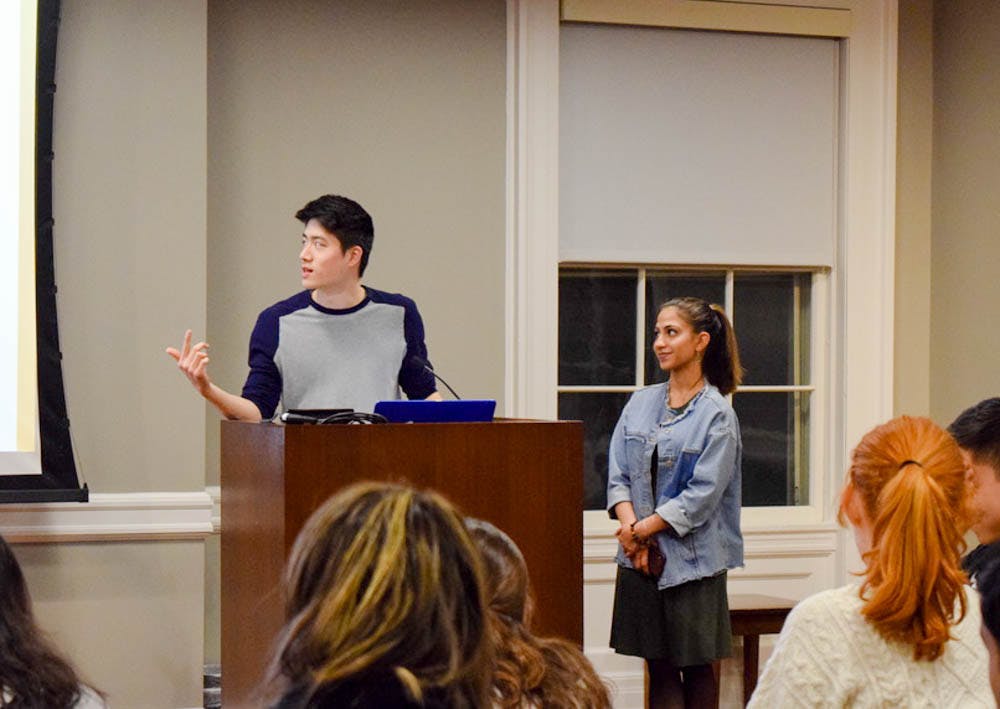Provost Richard Locke P’18 spoke to the Undergraduate Council of Students about diversity in faculty hiring at its general body meeting Wednesday evening.
Locke discussed the University’s strategic plan, Building on Distinction, and its Pathways to Diversity and Inclusion Action Plan in the context of faculty hiring.
The plans aim to “make sure we build a university that attracts and retains the best and brightest from all backgrounds,” Locke said, in addition to going beyond “compositional diversity” to emphasize a commitment to being “truly inclusive.”
“The DIAP … is one of the most ambitious plans of all of the major research universities,” Locke told The Herald after the meeting.
Within the hiring cycle, Locke said that the University authorizes searches based on factors including department proposals, evaluated need and potential gains from an additional hire.
Locke discussed strategies for hiring that promote diversity and inclusivity, such as hiring multiple people of color simultaneously and holding trainings for all department chairs and directors that confront biases in the hiring processes.
The University has also recently started considering the overall demographics of those earning doctoral degrees in various fields, Locke said. Departments receive that data and should maintain hiring pools that reflect the makeup of the eligible candidate pool.
“We are much more data-driven and interventionist than we were even three years ago,” Locke said.
In 2011, the percentage of University hires from historically underrepresented groups in terms of race and ethnicity was at five percent, according to data Locke presented at the meeting. It hit a high of 41 percent in 2016-17 and was at 26 percent in 2017-18.
In terms of supporting faculty of HUGs at the University, Locke mentioned the faculty of color network created within the past several years to support faculty in academic, social and community contexts.
“The idea is to recognize that it’s formal and informal mechanisms that are needed to really support faculty,” he said.
During the question-and-answer portion of the presentation, Chair of Student Wellness Shivani Nishar ’20 asked Locke about how the University is “bringing conversations about disability and neurodivergence, specifically, into the hiring process.”
The DIAP uses the federal categories of HUGs, which are based on race and ethnicity, Locke said.
“We are way behind on (considering ability), to be honest, and we are only now beginning to pay a lot of attention” to ability, Locke said in response. “What we’re trying to do is educate people (and pay) particular attention to making sure that we’re recruiting and supporting them while they’re here. It’s not where it should be, but we’re slowly but surely waking up to it.”
After reviewing Student and Employee Accessibility Services, Locke said it was clear that the University should improve resources available through SEAS and “educate people on these issues” much better.
UCS Secretary Vanessa Garcia ’20.5 asked about how the University works to acknowledge more specific categories within broader groups when hiring, specifically regarding Southeast Asian and East Asian identities.
“These identity categories are much more complex than the way the (U.S.) Department of Education gives the check boxes,” Locke said in response. “We don’t privilege one over the other. … When we’re recruiting faculty, we’re trying to get the very best people for the job that we’re advertising. How they self-report is what we take.”
UCS Vice President William Zhou ’20 asked about the support in place to increase diversity within departments that are progressing more slowly under their departmental DIAPs.
“We’re paying a lot of attention to all departments because (diversity) should be in every part of the University,” Locke said. “My hope is that what we’re doing just becomes institutionalized. … If we change the composition of the people here, then it’s my hope that slowly but surely we can change the basic organizational processes and the culture of the place.”





